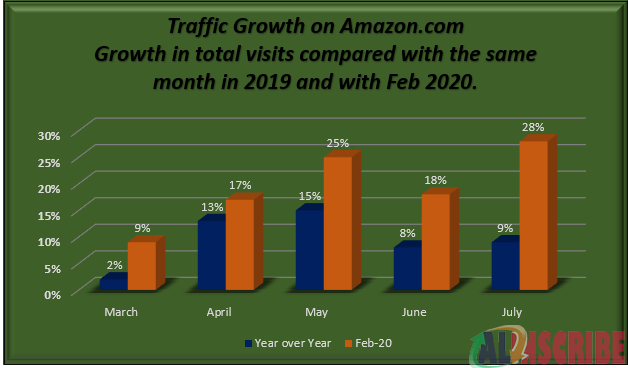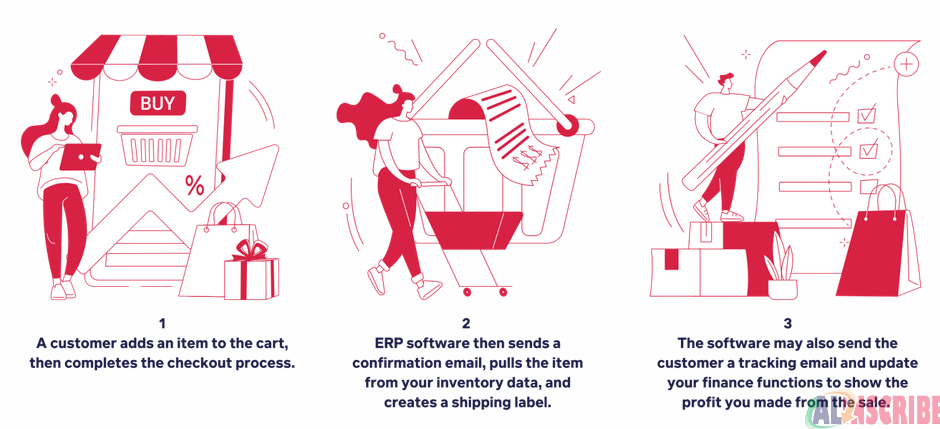Ecommerce ERP : How Does the Integration Of ERP Benefits Ecommerce Business?

The COVID-19 pandemic led to a huge impact on e-commerce, and thus, the economic disruptions caused by the coronavirus are being reflected in B2B and B2C businesses. It forced businesses to analyze and reassess their decades-old traditional business models or instead shut down permanently. The pandemic has placed Ecommerce at the forefront of retail business. People staying at home or working remotely at the time of this virulent disease, instead of visiting a brick-and-mortar store- prefer to shop online. Total retail sales continued to decline and the coronavirus pandemic accelerated the transition from general stores to online shopping. Unsurprisingly, big players like Amazon, Walmart, and Target were benefited from the prompt transition to Ecommerce during the outbreak.

Ecommerce has changed the way enterprises conduct business and communicate with their consumers. Nearly every retailer has the urge to put up an online store. However, managing an online business is tough and comes with huge and arduous stress for retailers if the storefront is not integrated with their Ecommerce ERP systems and utilizes its potential to upscale their business.
Possible reasons behind the integration of Ecommerce ERP integration:
Happens most of the time that businesses often overlook the urgency of integrating E-commerce with ERP, the main reason being the cost or business interruptions. When you integrate the sales channel of your Ecommerce with ERP systems, it enables you to function even more competently as a business and the costs seem to be worth it. Integration helps to pass the data between your systems automatically, thus eliminating the need for entering data manually from one system to another. Manually entering sales orders and customer information into ERP after receiving an online order is prone to human errors. The importance of Ecommerce ERP integration is amalgamating the frontend online store with the backend ERP systems. Whether it is Magento, Shopify, BigCommerce, or whichever front end it may be, they tend to pass the information from the front end to the ERP at the backend and vice versa which creates a seamless user experience for both entities. It is well known that the Ecommerce industry, which itself carries “E for Electronic”, cannot function without appropriate IT and digital resources. With increasing online demand and sales, you must synchronize the business activities and for that, you need to have sophisticated yet robust Enterprise Resource Planning Solutions.
How does Ecommerce ERP Portal work?
With the implementation of Ecommerce ERP software, the Ecommerce website becomes more manageable and organized with a streamlined order process.
The diagram below will depict how-

In this new era of digital transformation, more value is assigned to transparency than before. With this integration, your customer continues to be in the loop of the sales process.
Benefits of using Ecommerce ERP systems:
1. Elimination of Human Errors:
It’s the fact of life that humans make mistakes, and it can have significant business impacts. Human errors are divided into the following categories:
- Lapses in memory where an employee may forget to perform a certain task, specific action, step, or procedure
- Slips when an employee performs wrong action or incorrectly interprets information
- Knowledge-based mistakes when an employee lacks experience or applies logic way off the mark.
- Rule-based mistakes may occur when an employee follows a bad business rule that generates an error, or a correct rule is in place but unfortunately applied in an incorrect manner
Enterprise Resource Planning systems can be leveraged to reduce these human errors and mistakes that occur in the work environment.
There are some ways in which Ecommerce ERP systems trim down human errors-
- Data Consolidation: Data spread across different systems and networks have no way to communicate with each other, due to which redundancy and errors can occur. This could create hindrances for workers to continuously update the same file over and over again for each network system. It may lead to several versions of the same file with different information and lacks authenticity. Now, how does an Ecommerce ERP system help? ERP system places all the data into one centralized arrangement that can be accessed across different departments of the company. When the data is updated in real-time, employees tend to become more proactive and productive in their work. What’s more, accountability is now in play as any modifications can now be tracked and monitored.
- Communication Enhancement: Employees can easily access the information that is more germane to their tasks with ERP’s interactive features and tools, allowing for more effortless communication within the organization, so no one is left out of the loop. Employees and managers have now more control while updating business rules or rectifying issues and can enlighten the workforce about these modifications to reduce rule-based mistakes.
- Manual Tasks Automation: Manual tasks are prone to manual errors. They can be mitigated with the help of automated features offered by ERP solutions. An Ecommerce ERP system can reduce imputing errors and help employees focus their time on more productive undertakings. ERP transforms the raw financial data into standard financial statements, balance sheets, and ledgers. So, if you have to prepare for meetings, make quick decisions, or navigate various executive roles, you can do it effortlessly as they are no longer hindered by the delays associated with in-house legacy systems and manual procedures.
2. Availability of Real-time Data:
ERP software has endless benefits attached to it, out of those, the best is access to real-time data. Real-time information makes you better comprehend the real scenario in your business. This real-time ERP data consists of customer transactions, the location of orders, the location of stocks, the inventory of raw materials, etc. Real-time analytics has the potential to transform E-commerce business by tendering actionable insights that provide precise and effective decision-making.

Some of the areas in E-commerce business where Real-time information can prove to be useful are as follows-
- Real-time Personalization: The rate at which companies have been gathering data is just tremendous. Basic information like gender, age, and past online activities help in drawing valuable insights that can be used for personalization by marketers. With the help of real-time E-commerce analytics, online retailers can commingle the data gathered from different sources to understand the future demands of the customers.
- Use of Real-time Analytics to leverage Social Media Campaigns: Scrutinizing the performance of social media campaigns in real time can help to track the links precisely that would lead to specific social-media posts. This would help you stay connected with the targeted consumers and drive traffic to your online store. Moreover, with real-time ERP data, it becomes easy to analyze consumers’ opinions and identify potential leads along with the areas involving customer satisfaction and grievances.
- Monitor Revenue Targets and compare with the previous performance: Real-time data also helps ecommerce stores to compare their revenue against the daily targets and the ones that were achieved last week. If you lag behind your goals, then you can take the necessary actions.
- Real-time Reporting: Real-time reporting is helpful for checking potential issues and analyzing the traffic on the website. It succors in troubleshooting conversions when the traffic is at its peak. Real-time data and reports help to gain insight into weekly customer behavior and determine the things that might be creating issues in getting conversions.
- Real-time data to boost Inventory Management: For instance, Festive seasons are considered to be eventful and hectic time for E-commerce retailers as there is an upsurge in the demand for specific products. During that time, you can carve out strategies to prepare yourself ahead of time. You can enhance your supply chain management with the help of real-time inventory data, schedule the processing of raw materials, and eliminate the possibility of stock-out situations and excess stocks. Real-time inventory management can certainly help in upholding the right size of inventory.
3. Lower Operational Costs:
Cost Cutting became a hot topic since the Covid-19 pandemic began. This economic crisis made several companies slash operational costs and survive in the business without incurring losses. Modern-day Ecommerce ERP systems are cost-effective and offer a guaranteed return on investment (ROI), improves profitability, reduce operational overheads, automate daily tasks, and create optimal production results.
Some of the ways in which ERP helps an organization to cut operational costs and create an optimal performance-oriented workspace-
- Complete the Work at the Origin itself: Conventionally, all data such as inquiry details, purchase order preparation, supplier/vendor o customer creation, etc. were entered by the workforce within the organization. In the Modern day concept, customers or related parties themselves register their personal details, and preferences, select items, and provide orders on ERP’s platform.
- GPS and Biometric-Enabled Attendance: Organizations can now compute and oversee the attendance of employees who work from home, office, or remote sites. This comparatively cuts operational costs by eliminating attendance machines, peripherals costs, and falsification and facilitating online attendance and live synchronization.
- Mobile/PDA-Enabled Asset Management: Indecorous inventory and asset control lead to bleeding money, damaged items, and huge wastages. Ecommerce ERP software with an integrated PDA system/ mobile enables you to restructure your inventory optimally and cut operational costs.
- Intelligent Requirement Calculation: Smart Reorder calculation is a significant feature of ERP software that regulates a company’s stocks and inventory using intelligent forecasts, sales matrix, and pattern analysis. The system recognizes the precise moment for re-ordering stock, controlling production, regulating existing stock, tracing least sold items, and circumventing bottleneck situations, thus, reducing operational costs.
- Budget Vs. Actual Locking: Integration of Ecommerce with ERP helps companies to regulate their expenses and stick to their budgets using its inbuilt technologies and tools. With the use of Smart WBS (Work Breakdown Structures) and segment-wise estimations, ERP systems provide detailed and accurate cost information. It helps to reduce costs by analyzing the budget against actual costs during each stage of business using real time data and analytics.
4. Improved Customer Satisfaction:
ERP systems help you to deliver a positive customer experience and contribute to the growth of your company by creating happy customers. With increased customer satisfaction, you will witness enhanced customer loyalty, positive word-of-mouth referrals, and more 5-star ratings for your company.
Tools like contact management and CRM functionality help you to retain customers and allow your sales rep to track customer interactions, store addresses, order history, and more.
Studies show that 84% of customers get frustrated and agitated when service agents fail to address their issues and grievances. Therefore, making customer satisfaction a priority can be a way to get a competitive edge.
Ecommerce ERP systems help you make achievable and time-bound commitments to customers and store mission-critical information in one place, from inventory levels to supply chain and orders placed to customer details.
With an ERP system in place, you can rest assured that your customers will be delighted with on-time deliveries and with fresh products.
5. Achieve Global Sales and Steady Growth:

An ERP system is the backbone of any global manufacturer. To become a Global company, you need to pull supply chain data for individual units and get a consolidated view of companywide information and extract a clear picture of the financial implications of every decision. As a global company and to achieve global sales, you will have to contend with handling business in different currencies, languages, and exchange rates. A good Ecommerce ERP system can be a powerful facilitator for translating currencies across national borders while local users can view the financial data in their local currencies and languages. The integration of ERP with Ecommerce enables many automated features that B2B and B2C customers love such as tax calculations from multiple tax jurisdictions, onsite currency conversions, and custom catalogs based on the customer’s purchasing habits.
There are many other benefits of Ecommerce ERP integration with your online shopfront. To get the most out of it, you need to be sure to select a partner who is an expert on your business and how beautifully they cater to your specific business needs. There are many types of ERP solutions available, but the most common, longstanding, and accustomed to B2B businesses are:
- Dynamics365
- E2 Shop System
- SAP
- Workday
- Odoo
- EPRAG Software
- Acumatica
- Aptean ERP
- Epicor
- Sage X3 ERP
- Brightpearl
- Axelor
ERP Ecommerce Integration- Future-oriented Growth!
If you want your business to flourish and prosper with automated inventory updates, order tracking, error-free accounting, and seamless reporting, an integrated ERP solution can assist you in taking your online business to the next level without increasing your employee workload.
For Future-proof headway, you need future-proof solutions- that’s where an Ecommerce ERP solution steps in. Ensure your online customer experience is as seamless as possible where your existing consumers and potential prospects are pleased and gratified.
Article Comments
Similar Articles
Articles Search
Sponsor
There are zero sub-categories in this parent category.
There are zero sub-categories in this parent category.
There are zero sub-categories in this parent category.
















